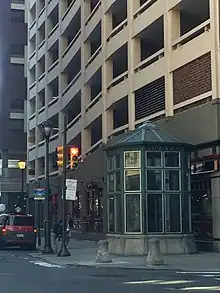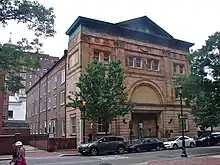 12–13th & Locust station on Locust Street in April 2017 | |
| Part of | Philadelphia, Pennsylvania, U.S. |
|---|---|
| Maintained by | PennDOT and City of Philadelphia |
| Coordinates | 39°56′55″N 75°10′05″W / 39.948544°N 75.167946°W |
Locust Street is a major historic street in Center City Philadelphia. The street is the location of several prominent Philadelphia-based buildings, historic sights, and high-rise residential locations. It is an east–west street throughout Center City Philadelphia and runs largely parallel to Chestnut Street, another major Center City Philadelphia street.
Locust Street is one of several Philadelphia streets bordering Rittenhouse Square, one of the five original parks established by the city's founder, William Penn.
History

Locust Street is now a hybrid of commercial and residential buildings. It historically was exclusively a residential street with mansions and home to many of the city's most affluent residents.
The street includes historical building structures designed by some of the Gilded Age's preeminent architects, including a Horace Trumbauer-designed Beaux-Arts limestone building at 1629 Locust Street, a Georgian Revival set of buildings designed by Cope and Stewardson at 1631 and 1633 Locust Streets, a Frank Miles Day-designed Medieval mansion at 17th and Locust Streets, and several John Notman-designed houses and St. Mark’s Church on the 1600 block of Locust Street.[1]
Notable residents
Since the 18th century, Locust Street has been the residence of several prominent Americans.
Edgar Allan Poe
Between 1838 and 1844, the famed author and poet Edgar Allan Poe lived at four different locations in Philadelphia, including one residence at 16th and Locust Streets. While in Philadelphia, Poe authored 31 stories, including "The Murders in the Rue Morgue" in 1841 and "The Gold-Bug" and "The Tell-Tale Heart", both in 1843.[2][3]
General Robert Patterson
Robert Patterson, a Union Army general during the American Civil War, resided at a three-story Greek Revival mansion at 13th and Locust Streets from 1836 until his death in 1881.[4]
Notable events
First Republican National Convention
In 1856, the first Republican nominating convention for president and vice president was held at Musical Fund Hall at 808 Locust Street.
1981 police officer shooting
On December 9, 1981, at 3:55am, Philadelphia Police Department officer Daniel Faulkner conducted a traffic stop of a vehicle carrying Marxist political activist Mumia Abu-Jamal's younger brother William Cook at the intersection of 13th and Locust Streets. During the stop, Faulkner and Cook became engaged in a physical confrontation.[5]
Driving his cab in the vicinity, Abu-Jamal observed the altercation, parked, and ran across the street toward Cook's car. Faulkner was shot in the back and face. He shot Abu-Jamal in the stomach. Faulkner died at the scene from the gunshot to his head, and Abu-Jamal was treated for his wounds at Thomas Jefferson University Hospital, recovered, and was charged with first-degree murder of Faulkner.
In May 1983, Abu-Jamal was convicted and sentenced to death in May 1983.[6] The death sentence was later dropped, but Abu-Jamal's conviction became a global controversy and subject of extensive attention in popular culture, including four documentaries, multiple books, and multiple songs and references in contemporary music.
Notable buildings and structures
Locust Street is the location of several major Philadelphia-based non-profit and historical organizations, including:
- Academy of Music, one of the city's most prominent concert halls, located at the corner of Broad and Locust Streets.
- Clarence B. Moore House, the former residence of archeologist Clarence Bloomfield Moore, at 1321 Locust Street, desgined by Wilson Eyre, built in 1890, and named to the National Register of Historic Places in 1973.
- Curtis Institute of Music, one of the nation's premier music conservatories, founded in 1924, located at 1726 Locust Street.[7]
- Dr. Joseph Leidy House, a historic residence at 1310 Locust Street, built in 1893 and 1894, also designed by Wilson Eyre, and named to the National Register of Historic Places in 1980.
- Equitable Trust Building, a historic skyscraper designed by Horace Trumbauer, is located at 1405 Locust Street.
- Historical Society of Pennsylvania, the primary historical society for Pennsylvania, located at 1300 Locust Street.[8]
- Jefferson Health, a major Philadelphia healthcare network, maintains one of its primary outpatient facilities at 1020 Locust Street.[9]
- Library Company of Philadelphia, the nation's oldest library founded by Benjamin Franklin in 1731, housing approximately 500,000 books and 70,000 other items, including the Mayflower Compact, major Revolutionary-era documents, the first editions of two American literary classics, Moby-Dick by Herman Melville and Leaves of Grass by Walt Whitman, and 2,150 items that once belonged to Franklin, located at 1314 Locust Street.[10]
- Musical Fund Hall, a historic Philadelphia venue that has hosted notable speakers, including Marquis de Lafayette, an American Revolutionary War ally (in 1825), Charles Dickens, author of A Tale of Two Cities (in 1842), and the first Republican National Convention (in 1856), located at 808 Locust Street.
- St. Mark's Episcopal Church, founded in 1848 as part of the Oxford Movement, located at 1607-1627 Locust Street on Rittenhouse Square.
Subway stations
PATCO Speedline operates three subway station on Locust Street:
- 9–10th & Locust station at 9th and Locust Street
- 12–13th & Locust station at 12th and Locust Street
- 15–16th & Locust station at 15th and Locust Street
References
- ↑ "Look up! 19th Century Luxe Life on Locust Street", WHYY-FM, November 28, 2010
- ↑ Oberholtzer, Ellis Paxson. The Literary History of Philadelphia. Philadelphia: George W. Jacobs & Co., 1906: 286. ISBN 1-932109-45-5
- ↑ "Edgar Allan Poe House", The Constitutional Walking Tour, August 22, 2018
- ↑ "The Patterson Mansion" at Historical Society of Pennsylvania
- ↑ "Death-Row Clock Ticking for Activist Convicted of Killing Officer : Justice: Mumia Abu-Jamal files appeal as Pennsylvania governor sets execution date for Aug. 13. Supporters, including Ed Asner and Whoopi Goldberg, say he is a political prisoner mistreated because of his race and views", The Los Angeles Times, July 2, 1995
- ↑ "Trial transcript, pp. 100–103". Commonwealth vs. Mumia Abu-Jamal a.k.a. Wesley Cook. Court of Common Pleas, Philadelphia Criminal Trial Division. July 3, 1982. Archived from the original on December 13, 2007. Retrieved November 23, 2007.
- ↑ [https://www.curtis.edu/ Curtis Institute of Music official website
- ↑ Historical Society of Pennsylvania official website
- ↑ 1020 Locust Street at Jefferson Health
- ↑ The Library Company official website
External links
- "Locust Street" at Philadelphia Walking TOURS